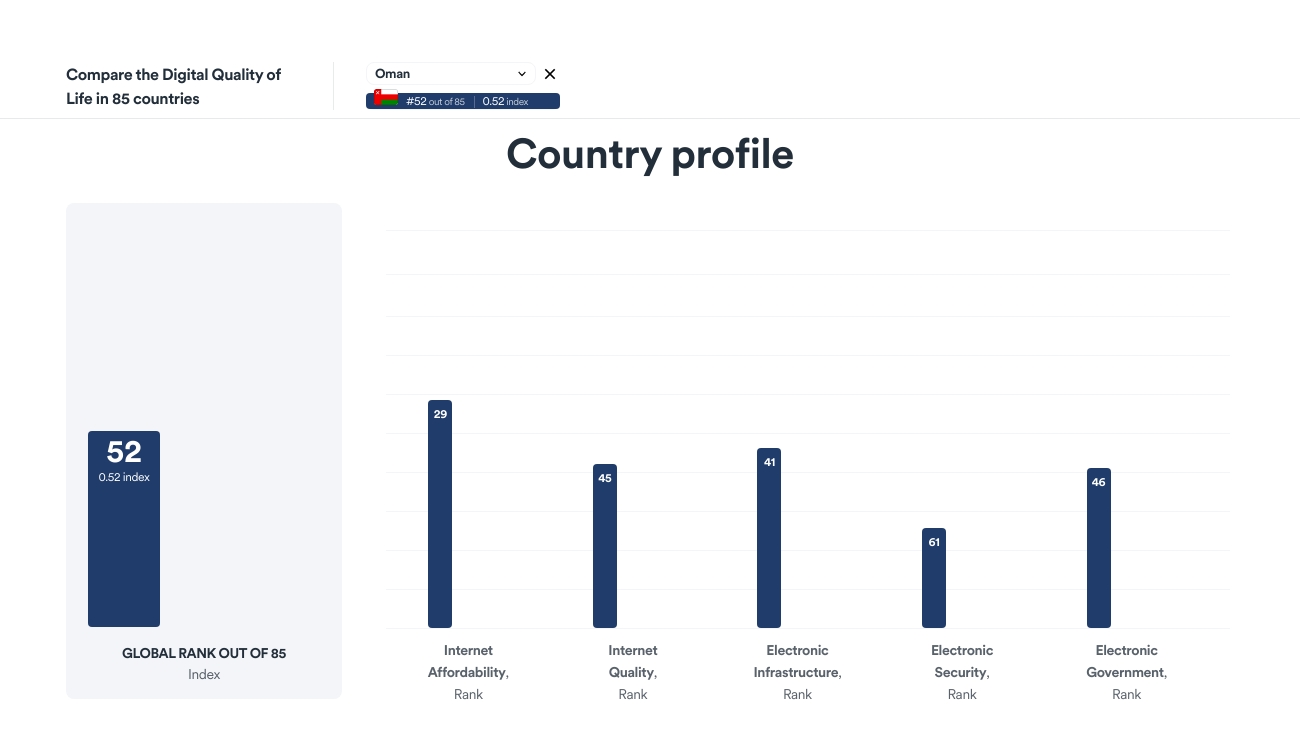

The Sultanate has made it into the top 20 in terms of mobile internet affordability, according to the results of the Digital Quality of Life (DQL) Index 2020. However, it occupies 29th position in the overall internet affordability index due to low affordability of broadband.
The Sultanate was ranked 52nd in the world, according to the DQL Index 2020. The DQL index is published annually based on research conducted by Surfshark, an international cyber security and private protection company designed to equip its users with a broad online security package. The study covers 81 per cent of the global population (6.3 billion people).
In terms of internet quality, the Sultanate stood in the 45th place. Mobile internet stability and broadband internet speed are the areas of improvement in order to move up in the ranking. When it comes to e-security, the Sultanate lags behind the majority of countries. Despite ranking in the 15th position globally in terms of cyber security, it has no data protection laws available in the country.
In the overall digital quality of life index, Saudi Arabia is ranked 45th whereas the UAE is placed in the 31st position. Researchers measure internet quality, affordability, e-security, online government services, and e-infrastructure.
This year’s edition of the DQL research concluded that 7 out of 10 countries with the highest digital quality of life are in Europe, with Denmark taking the global lead among 85 countries.
Also, this year Surfshark took into account the impact of the COVID-19 outbreak on internet quality, among other factors, such as internet affordability, electronic government, e-security, and electronic infrastructure. Regionally, Canada stands out as a country with the highest digital quality of life in the Americas while Japan takes the leading position in Asia.
Among countries in Africa, people in South Africa enjoy the highest quality of their digital lives whereas New Zealand leads in Oceania, outperforming Australia in various digital areas.
The three key global findings of the research are:
The COVID-19 outbreak had a significant impact on internet stability. 49 of 85 countries experienced drops in mobile and 44 in broadband speed due to the WFH setting.
High inequality in affordability: people in 75 per cent of the researched countries have to work more than the global average to afford the internet.
E-security, e-infrastructure, and e-government have a more significant correlation with the digital quality of life than GDP per capita.
Dom Dimas, Head of DQL research at Surfshark, explains that “any country’s digital advancement and people’s online experiences have tangible relation to its economic potential and population's overall wellbeing. To demonstrate this coherence, we are continuing our annual Digital Quality of Life research project that investigates multiple factors influencing people's online experiences.”
“The index aims to overlook any country’s digital preparedness's status quo and establish a common ground for further conversation.”
The researchers found out that the best quality internet in the world is in Singapore, followed by Sweden and the Netherlands, whereas the internet, combining both mobile and broadband, is most affordable in Israel, Canada and Azerbaijan.
The United Kingdom, France and Lithuania stand out globally for their e-security while Singapore, the UK and the US lead in the advancement of e-governance services. The last pillar examining the countries by their electronic infrastructure development level ranks the UAE, Sweden and Denmark as global leaders in this area.
The DQL study showed that none of the researched countries crossed the threshold of 0.8, and no country made it to the top three in all of the pillars, reflecting room for improvement in all digital areas.
The DQL research examined a total population of more than 6.3 billion people in terms of 12 indicators grouped into five pillars. The study is based on information provided by the United Nations, the World Bank, Freedom House, the International Communications Union, and other public data sources.
The top 20 countries in the index in the descending order are Denmark, Sweden, Canada, France, Norway, Netherlands, United Kingdom, Israel, Japan, Poland, Finland, Singapore, Estonia, Austria, Switzerland, Germany, New Zealand, Spain, Australia, and Italy.


Oman Observer is now on the WhatsApp channel. Click here



